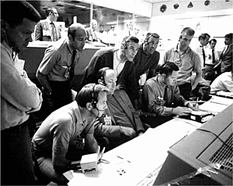Meaning
 Originally a genuine report of a life-threatening fault. Now used humorously to report any kind of problem.
Originally a genuine report of a life-threatening fault. Now used humorously to report any kind of problem.
Origin
John Swigert, Jr. and James Lovell who, with Fred Haise Jr., made up the crew of the US's Apollo 13 moon flight used (almost) this phrase to report a major technical problem back to their Houston base.
Swigert: 'Okay, Houston, we've had a problem here.'
Duke: 'This is Houston. Say again please.'
Lovell: 'Houston, we've had a problem. We've had a main B bus undervolt.'
The phrase was later used as the tagline for the 1995 film - Apollo 13.
"shiver my timbers!"
Meaning
An oath, expressing annoyance or surprise.
Origin
 Those of a certain age will remember Robert Newton, rolling his eyes and yarring it up in his archetypal Hollywood pirate role - Long John Silver in the 1950 film Treasure Island.
Those of a certain age will remember Robert Newton, rolling his eyes and yarring it up in his archetypal Hollywood pirate role - Long John Silver in the 1950 film Treasure Island.
Robert Louis Stevenson used shiver my timbers several times in the original 1883 book, for example:
"Well, he [Old Pew] is dead now and under hatches; but for two year before that, shiver my timbers, the man was starving!"
Of course, Newton made the most of such 'parrot on the shoulder' phrases and it also appears several times in the film's screenplay. Newton's version, like that of all self-respecting stage pirates, was shiver me timbers, with the occasional 'aaarh, Jim lad' thrown in.
The first appearance of the phrase in print is in Frederick Marryat's Jacob Faithful, 1834:
"I won't thrash you Tom. Shiver my timbers if I do."
One meaning of shiver, which is now largely forgotten, is 'to break into pieces'. That meaning originated at least as early as the 14th century and is recorded in several Old English texts. A more recent citation, which makes that meaning clear, is James Froude's Caesar; a sketch, 1879:
"As he crossed the hall, his statue fell, and shivered on the stones."
So, the sailor's oath shiver my timbers, is synonymous with (if so and so happens then...) let my boat breaks into pieces. The question is whether any real sailor used the term or whether it was just a literary invention. Well, we can't be sure, although the fact that it actually means something and isn't just Newton-style hokum must count in favour of it being an authentic sailor's oath.
"i'm in a pickle!"
Meaning
In a quandary or some other difficult position.
Origin
This alludes to the pickling liquid made from brines and vinegar which is used to preserve food, and presumably to the imagined difficult of being stuck in such. The phrase was known in Dutch by 1561 - ' in de pekel zitten' meaning 'to be in a pickle'.
There are a few references to ill pickles and this pickle etc. in print in the late 16th century, but Shakespeare appears to be the first to use in a pickle, in The Tempest, 1611:
ALONSO:
And Trinculo is reeling ripe: where should they
Find this grand liquor that hath gilded 'em?
How camest thou in this pickle?TRINCULO:
I have been in such a pickle since I
saw you last that, I fear me, will never out of
my bones: I shall not fear fly-blowing.
Meaning
My mistake - I'm to blame.
Origin
This slang term originated in about 1970. At that time, i.e. pre the widespread use of the Internet, slang terms often circulated at street level for many years before being adopted by anyone who felt inclined to write them down. That's clearly not the case any longer of course and any word or phrase that is widely known is dateable quite precisely via website logs.
The first citation in print is C. Wielgus and A. Wolff's, 'Back-in-your-face Guide to Pick-up Basketball', 1986:
"My bad, an expression of contrition uttered after making a bad pass or missing an opponent."
 'My bad' came into widespread popular use in the mid to late-1990s in the USA via the 1995 movie “Clueless”. This starred Alicia Silverstone and contains what seems to have been the first use of the phrase in the mainstream media. The 1994 'Green revision pages' for the movie script has a scene with Alicia Silverstone's character learning to drive:
'My bad' came into widespread popular use in the mid to late-1990s in the USA via the 1995 movie “Clueless”. This starred Alicia Silverstone and contains what seems to have been the first use of the phrase in the mainstream media. The 1994 'Green revision pages' for the movie script has a scene with Alicia Silverstone's character learning to drive: "Cher swerves - to avoid killing a person on a bicycle. Cher: Whoops, my bad."






2 comments:
i have the original version of the little mermaid yg you post. Kira aku inda paham lah kaki si ariel sakit.. hehehe...
Then yg hensel & gretel atu the kids killed the witch. Membunuh kanak2 nya..
It was originally My Bag back in the 70s.It was a card game term.
Post a Comment